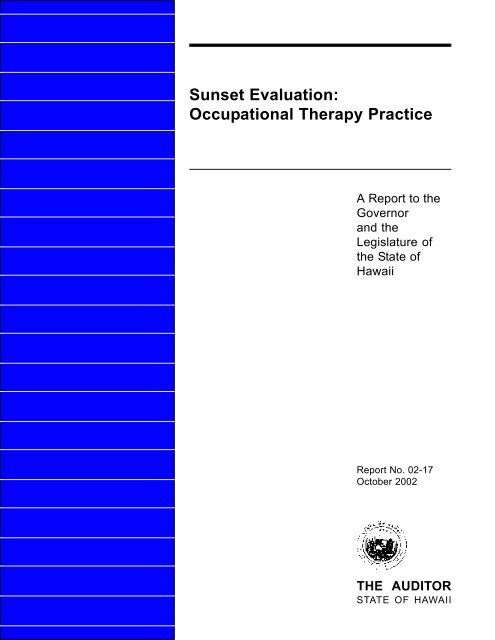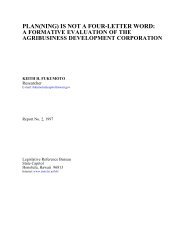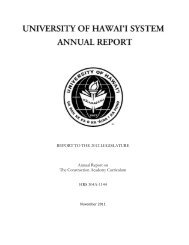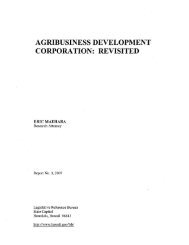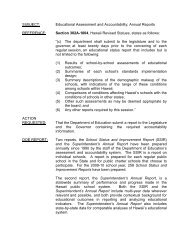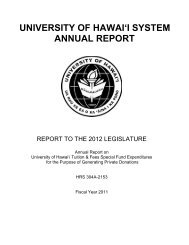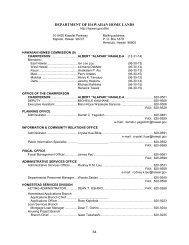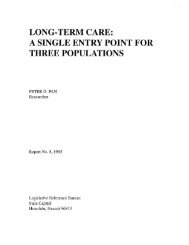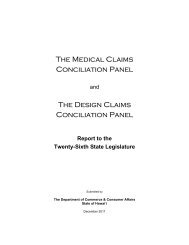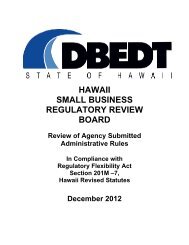Sunset Evaluation: Occupational Therapy Practice
Sunset Evaluation: Occupational Therapy Practice
Sunset Evaluation: Occupational Therapy Practice
Create successful ePaper yourself
Turn your PDF publications into a flip-book with our unique Google optimized e-Paper software.
<strong>Sunset</strong> <strong>Evaluation</strong>:<br />
<strong>Occupational</strong> <strong>Therapy</strong> <strong>Practice</strong><br />
A Report to the<br />
Governor<br />
and the<br />
Legislature of<br />
the State of<br />
Hawaii<br />
Report No. 02-17<br />
October 2002<br />
THE AUDITOR<br />
STATE OF HAWAII
Office of the Auditor<br />
The missions of the Office of the Auditor are assigned by the Hawaii State Constitution<br />
(Article VII, Section 10). The primary mission is to conduct post audits of the transactions,<br />
accounts, programs, and performance of public agencies. A supplemental mission is to<br />
conduct such other investigations and prepare such additional reports as may be directed by<br />
the Legislature.<br />
Under its assigned missions, the office conducts the following types of examinations:<br />
1. Financial audits attest to the fairness of the financial statements of agencies. They<br />
examine the adequacy of the financial records and accounting and internal controls, and<br />
they determine the legality and propriety of expenditures.<br />
2. Management audits, which are also referred to as performance audits, examine the<br />
effectiveness of programs or the efficiency of agencies or both. These audits are also<br />
called program audits, when they focus on whether programs are attaining the objectives<br />
and results expected of them, and operations audits, when they examine how well<br />
agencies are organized and managed and how efficiently they acquire and utilize<br />
resources.<br />
3. <strong>Sunset</strong> evaluations evaluate new professional and occupational licensing programs to<br />
determine whether the programs should be terminated, continued, or modified. These<br />
evaluations are conducted in accordance with criteria established by statute.<br />
4. Sunrise analyses are similar to sunset evaluations, but they apply to proposed rather than<br />
existing regulatory programs. Before a new professional and occupational licensing<br />
program can be enacted, the statutes require that the measure be analyzed by the Office<br />
of the Auditor as to its probable effects.<br />
5. Health insurance analyses examine bills that propose to mandate certain health<br />
insurance benefits. Such bills cannot be enacted unless they are referred to the Office of<br />
the Auditor for an assessment of the social and financial impact of the proposed<br />
measure.<br />
6. Analyses of proposed special funds and existing trust and revolving funds determine if<br />
proposals to establish these funds are existing funds meet legislative criteria.<br />
7. Procurement compliance audits and other procurement-related monitoring assist the<br />
Legislature in overseeing government procurement practices.<br />
8. Fiscal accountability reports analyze expenditures by the state Department of Education<br />
in various areas.<br />
9. Special studies respond to requests from both houses of the Legislature. The studies<br />
usually address specific problems for which the Legislature is seeking solutions.<br />
Hawaii’s laws provide the Auditor with broad powers to examine all books, records, files,<br />
papers, and documents and all financial affairs of every agency. The Auditor also has the<br />
authority to summon persons to produce records and to question persons under oath.<br />
However, the Office of the Auditor exercises no control function, and its authority is limited to<br />
reviewing, evaluating, and reporting on its findings and recommendations to the Legislature and<br />
the Governor.<br />
THE AUDITOR<br />
STATE OF HAWAII<br />
Kekuanao‘a Building<br />
465 S. King Street, Room 500<br />
Honolulu, Hawaii 96813
The Auditor State of Hawaii<br />
OVERVIEW<br />
<strong>Sunset</strong> <strong>Evaluation</strong>: <strong>Occupational</strong> <strong>Therapy</strong> <strong>Practice</strong><br />
Report No. 02-17, October 2002<br />
Summary<br />
We evaluated the regulation of occupational therapy practice under Chapter 457G,<br />
Hawaii Revised Statutes (HRS), which is scheduled for repeal on December 31,<br />
2003. <strong>Occupational</strong> therapists help people develop, recover, or maintain their<br />
daily living and working skills. They may work with individuals who are mentally,<br />
physically, developmentally, or emotionally disabled. The goal of occupational<br />
therapists is to help clients lead independent, productive, and satisfying lives.<br />
In 1998, the Legislature found that full-scale regulation of occupational therapists<br />
was not warranted because the practice of occupational therapy posed little risk of<br />
actual harm to consumers. Therefore, the Legislature instituted a simple registration<br />
system under Chapter 457G (<strong>Occupational</strong> <strong>Therapy</strong> <strong>Practice</strong>), HRS. As of March<br />
2002, the Department of Commerce and Consumer Affairs reported a total of 331<br />
registered occupational therapists in Hawaii.<br />
We found that the regulation of occupational therapy practice is not warranted.<br />
The scope of practice for occupational therapy has not changed significantly since<br />
our previous review of the profession in 1997, which recommended against<br />
continued regulation. We also found that since 1998, the Regulated Industries<br />
Complaints Office, Office of Consumer Protection, Ombudsman, and the National<br />
Board for Certification in <strong>Occupational</strong> <strong>Therapy</strong> have not registered any complaints<br />
against an occupational therapist practicing in Hawaii. Furthermore, we note that<br />
employers of occupational therapists provide a level of protection for consumers<br />
and that other states have recently attempted to deregulate occupational therapy<br />
practice.<br />
However, if regulation of occupational therapy practice is continued, statutory<br />
amendments are needed. We found that the current law inappropriately equates<br />
registration with “licensure.” Additionally, references to occupational therapy<br />
assistants are confusing and the temporary permit provision is obsolete. We also<br />
suggest that the Legislature consider the potential benefits of including occupational<br />
therapists as qualified medical providers under Hawaii’s workers’ compensation<br />
law.<br />
Finally, if regulation is continued, the Department of Commerce and Consumer<br />
Affairs can make minor improvements. Although we found that the department<br />
operates the program with relative effectiveness, improvements are needed in<br />
collecting more timely and accurate information from registrants.<br />
4
Report No. 02-17 October 2002<br />
Recommendations<br />
and Response<br />
We recommended that the Legislature allow Chapter 457G, HRS, to be repealed<br />
as scheduled. If regulation continues, we recommended that the Legislature<br />
amend Chapter 457G, HRS, to remove language equating registration with<br />
“licensure,” as well as requirements relating to occupational therapy assistants and<br />
temporary permit provisions. Also, if regulation continues, we recommended that<br />
the Department of Commerce and Consumer Affairs amend its initial application<br />
form to emphasize that registrants must notify the department of any change in<br />
employment within 30 days of the change. Finally, we recommended amendments<br />
to the re-registration form requiring registrants to identify their current business<br />
addresses.<br />
Responding to a draft of our report, the Department of Commerce and Consumer<br />
Affairs generally agreed with all of our recommendations. The department<br />
indicated a willingness to work with the appropriate government agencies and<br />
industry organizations to facilitate recommended statutory changes. The department<br />
also reported that it will amend both its initial application and re-registration forms<br />
as recommended.<br />
Marion M. Higa Office of the Auditor<br />
State Auditor 465 South King Street, Room 500<br />
State of Hawaii Honolulu, Hawaii 96813<br />
(808) 587-0800<br />
FAX (808) 587-0830
<strong>Sunset</strong> <strong>Evaluation</strong>:<br />
<strong>Occupational</strong> <strong>Therapy</strong> <strong>Practice</strong><br />
A Report to the<br />
Governor<br />
and the<br />
Legislature of<br />
the State of<br />
Hawaii<br />
Submitted by<br />
THE AUDITOR<br />
STATE OF HAWAII<br />
Report No. 02-17<br />
October 2002
Foreword<br />
This report evaluates the regulation of occupational therapy practice<br />
under Chapter 457G, Hawaii Revised Statutes (HRS), which Section<br />
26H-4, HRS, schedules for repeal on December 31, 2003. The report<br />
presents our findings as to whether the regulatory program complies with<br />
policies in the sunset law and whether there is a reasonable need to<br />
regulate occupational therapy practice to protect the health, safety, and<br />
welfare of the public.<br />
We acknowledge the cooperation of the Department of Commerce and<br />
Consumer Affairs and other organizations and individuals whom we<br />
contacted during the course of our evaluation.<br />
Marion M. Higa<br />
State Auditor
Table of Contents<br />
Chapter 1 Introduction<br />
Background .................................................................... 1<br />
Objectives of the <strong>Evaluation</strong> ......................................... 5<br />
Scope and Methodology ................................................ 5<br />
Chapter 2 Regulation of <strong>Occupational</strong> <strong>Therapy</strong><br />
<strong>Practice</strong> Should Be Repealed<br />
Summary of Findings .................................................... 7<br />
Regulation of <strong>Occupational</strong> <strong>Therapy</strong> <strong>Practice</strong> Is Not<br />
Warranted ................................................................... 7<br />
If Regulation Continues, Statutory Amendments<br />
Are Needed ............................................................... 11<br />
If Regulation Continues, the Department Can Make<br />
Minor Improvements ................................................ 15<br />
Conclusion ................................................................... 17<br />
Recommendations........................................................ 18<br />
Notes ................................................................................................... 19<br />
Response of the Affected Agency ........................................ 21<br />
List of Exhibits<br />
Exhibit 1.1 <strong>Occupational</strong> <strong>Therapy</strong>: State Regulation..................... 4<br />
Exhibit 1.2 Registered <strong>Occupational</strong> Therapists: FY1998-99 -<br />
FY2001-02 .................................................................. 5<br />
Exhibit 2.1 Number of Complaints Filed Against <strong>Occupational</strong><br />
Therapists, CY1998-2001 .......................................... 9<br />
Exhibit 2.2 Registration Program Costs and Fees ......................... 16<br />
v
Chapter 1<br />
Introduction<br />
Background<br />
<strong>Occupational</strong><br />
therapists help people<br />
improve their daily<br />
living and working<br />
skills<br />
Chapter 1: Introduction<br />
The Hawaii Regulatory Licensing Reform Act, Chapter 26H, Hawaii<br />
Revised Statutes (HRS), establishes policies for occupational regulation<br />
and schedules the repeal of newly enacted occupational regulatory<br />
programs. The law directs the State Auditor to evaluate each board,<br />
commission, and regulatory program prior to its repeal date and<br />
determine whether it complies with the law’s policies and whether public<br />
interest requires reenactment, modification, or repeal of the law<br />
establishing the program.<br />
If the Auditor finds that the law establishing the regulatory program<br />
should be modified, the Auditor must include drafts of recommended<br />
legislation that would improve the policies, procedures, or practices of<br />
that program in the evaluation. Even if the Auditor finds that the law<br />
establishing the regulatory program should not be reenacted, the Auditor<br />
must still evaluate the effectiveness and efficiency of the program and<br />
make appropriate recommendations to improve its policies, procedures,<br />
and practices.<br />
We evaluated the regulation of occupational therapy practice under<br />
Chapter 457G, HRS, which is scheduled for repeal on December 31,<br />
2003.<br />
<strong>Occupational</strong> therapists help people develop, recover, or maintain their<br />
daily living and working skills. They may work with individuals who are<br />
mentally, physically, developmentally, or emotionally disabled. The<br />
practice of occupational therapy has been regulated in Hawaii since<br />
1978. In 1998, the Legislature found that full-scale regulation of<br />
occupational therapists was not warranted because the practice of<br />
occupational therapy posed little risk of actual harm to consumers.<br />
Therefore, the Legislature instituted a simple registration system under<br />
Chapter 457G (<strong>Occupational</strong> <strong>Therapy</strong> <strong>Practice</strong>), HRS.<br />
The goal of occupational therapists is to help clients lead independent,<br />
productive, and satisfying lives. Specific occupational therapy services<br />
aimed at achieving this goal range from helping clients use a computer to<br />
assisting them with dressing, cooking, and eating. <strong>Occupational</strong><br />
therapists also instruct clients who have permanent functional disabilities<br />
in how to use wheelchairs, splints, and other adaptive equipment or aids<br />
to assist them in eating and dressing. <strong>Occupational</strong> therapists who<br />
arrange employment and plan work activities for individuals whose<br />
1
2<br />
Chapter 1: Introduction<br />
All states currently<br />
regulate occupational<br />
therapy<br />
ability to function in a work environment has been impaired are known<br />
as industrial therapists. In schools, occupational therapists evaluate<br />
students’ abilities to function in a classroom setting, participate in school<br />
programs and activities, recommend and provide therapy, and modify<br />
classroom equipment.<br />
Nationally, occupational therapists held approximately 78,000 jobs in<br />
2000. Employment is projected to increase faster than the average for all<br />
occupations through 2010, as rapid growth in the number of middle-aged<br />
and elderly individuals increases the demand for therapeutic services.<br />
Hospitals will continue to employ a large number of occupational<br />
therapists to service acutely ill inpatients and staff their outpatient<br />
rehabilitation programs. Employment growth in schools will result from<br />
expansion of the school-age population and extended services for<br />
disabled students.<br />
The professional interests of occupational therapists are represented by<br />
two national organizations, the American <strong>Occupational</strong> <strong>Therapy</strong><br />
Association (AOTA) and the National Board for Certification in<br />
<strong>Occupational</strong> <strong>Therapy</strong>, Inc. (NBCOT). AOTA is the nationally<br />
recognized professional association for over 50,000 occupational<br />
therapists and occupational therapy assistants. AOTA’s mission is to<br />
advance the quality, availability, use, and support of occupational<br />
therapy. NBCOT is a not-for-profit credentialing agency that certifies<br />
professional occupational therapists. NBCOT also works with state<br />
regulatory authorities by providing credential, disciplinary, and<br />
regulatory information.<br />
All states currently regulate occupational therapy. Professional<br />
regulation generally falls into three categories: licensing, certification,<br />
or registration.<br />
Licensing gives persons who meet certain qualifications the legal right to<br />
deliver services—that is, to practice the profession.<br />
Certification restricts the use of certain titles to persons who meet certain<br />
qualifications, but does not bar others who do not use the title from<br />
offering such services. This is sometimes called title protection. It<br />
should be noted that government certification is not to be confused with<br />
professional certification, or credentialing, by private organizations.<br />
Registration involves practitioners signing up with a state’s government<br />
so that a roster or registry can exist to inform the public of the nature of<br />
practitioners’ services and to enable the State to track them. Registration<br />
can be mandatory or voluntary.
<strong>Occupational</strong> therapy<br />
practice has been<br />
regulated in Hawaii<br />
since 1978<br />
Our previous analysis<br />
found regulation<br />
unnecessary<br />
Chapter 1: Introduction<br />
Almost all states require licensure of occupational therapists (46), while<br />
a minority require registration (2), certification (1), or trademark<br />
registration (1). Exhibit 1.1 provides a list of regulatory schemes and the<br />
states that adhere to each form of regulation.<br />
Act 146, Session Laws of Hawaii (SLH) 1978, established the regulation<br />
of occupational therapy practice. Regulation consisted of a “title<br />
protection” law, whereby individuals had to meet certain requirements if<br />
they wanted to represent themselves as occupational therapists or use the<br />
title of “occupational therapist.” However, these individuals were not<br />
required to obtain a credential or notify the State that they were qualified<br />
to use the title. Act 146 was codified as Chapter 457G, HRS.<br />
In 1998 the Legislature amended Chapter 457G to its current status<br />
requiring registration. At present, no one may represent, advertise, or<br />
announce him or herself as an occupational therapist unless that person<br />
registers with the Department of Commerce and Consumer Affairs. In<br />
addition to registering with the department, occupational therapists must<br />
complete the educational requirements (graduation from an accredited<br />
occupational therapy educational program 1 ) and the six to nine months of<br />
work experience required for NBCOT certification. <strong>Occupational</strong><br />
therapists must also pass NBCOT’s national certification examination.<br />
Chapter 457G also allows individuals who have completed the required<br />
education and experience, but have not yet passed the national<br />
certification examination, to obtain a temporary permit to perform<br />
occupational therapy services under the direct supervision of a registered<br />
occupational therapist.<br />
The Department of Commerce and Consumer Affairs reports that there<br />
were 331 registered occupational therapists in Hawaii as of March 2002.<br />
The number of registered occupational therapists has increased from<br />
1998 to the present, as shown in Exhibit 1.2.<br />
In 1997, our office issued an Analysis of a Proposal to Expand the<br />
Regulation of <strong>Occupational</strong> Therapists, Report No. 97-15. In it, we<br />
reported that regulation of the practice of occupational therapy was not<br />
warranted and recommended that the Legislature repeal Chapter 457G.<br />
In recommending against regulation, we noted that the risk of harm to<br />
consumers appeared low; other protections existed for consumers;<br />
occupational therapy practice differed from physical therapy and<br />
massage therapy; and regulation, if at all, should be minimal. We went<br />
on to conclude that if the Legislature deemed regulation necessary,<br />
simple registration of occupational therapists should be sufficient.<br />
3
4<br />
Chapter 1: Introduction<br />
Exhibit 1.1<br />
<strong>Occupational</strong> <strong>Therapy</strong>: State Regulation<br />
States with Licensure Law<br />
(Year regulation was established)<br />
Alabama 1990 Nevada 1991<br />
Alaska 1987 New Hampshire 1977<br />
Arizona 1989 New Jersey 1993<br />
Arkansas 1977 New Mexico 1983<br />
California 2000 New York 1975<br />
Connecticut 1978 North Carolina 1984<br />
Delaware 1985 North Dakota 1983<br />
Florida 1975 Ohio 1976<br />
Georgia 1976 Oklahoma 1984<br />
Idaho 1987 Oregon 1977<br />
Illinois 1983 Pennsylvania 1982<br />
Iowa 1980 Rhode Island 1984<br />
Kansas 2002 South Carolina 1977<br />
Kentucky 1986 South Dakota 1986<br />
Louisiana 1979 Tennessee 1983<br />
Maine 1984 Texas 1983<br />
Maryland 1977 Utah 1977<br />
Massachusetts 1983 Vermont 2002<br />
Minnesota 2000 Virginia 1998<br />
Mississippi 1988 Washington 1984<br />
Missouri 1997 West Virginia 1978<br />
Montana 1985 Wisconsin 2000<br />
Nebraska 1984 Wyoming 1991<br />
States with Registration Law<br />
(Year regulation was established)<br />
Hawaii 1998<br />
Michigan 1988<br />
State with Certification Law<br />
(Year regulation was established)<br />
Indiana 1989<br />
State with Trademark Law<br />
(Year regulation was established)<br />
Colorado 1996<br />
Source: The American <strong>Occupational</strong> <strong>Therapy</strong> Association, July 2002
Objectives of the<br />
<strong>Evaluation</strong><br />
Scope and<br />
Methodology<br />
Exhibit 1.2<br />
Registered <strong>Occupational</strong> Therapists:<br />
FY1998-99 – FY2001-02<br />
FY Number of registered OT’s<br />
1998-99 240<br />
1999-00 280<br />
2000-01 349<br />
2001-02<br />
* As of March 11, 2002<br />
331*<br />
Source: Department of Commerce and Consumer Affairs<br />
Chapter 1: Introduction<br />
1. Determine whether regulation of the practice of occupational therapy<br />
is warranted.<br />
2. Determine whether the current regulatory requirements are<br />
appropriate.<br />
3. Determine whether the regulatory program is being implemented<br />
effectively and efficiently.<br />
4. Make recommendations as appropriate.<br />
The scope of our evaluation spanned the timeframe from the publication<br />
of our previous report on occupational therapists in 1997 to August 2002.<br />
To assess the need to regulate occupational therapy practice, we applied<br />
the regulation criteria set forth in Chapter 26H, HRS. The policies in<br />
Section 26H-2 were established by the Legislature to ensure that<br />
occupational regulation takes place only for the right reason, which is to<br />
protect consumers. Provisions in Section 26H-2 specify that:<br />
1. Regulation in the form of licensure or other restrictions should be<br />
required only when reasonably necessary to protect the health, safety<br />
or welfare of consumers;<br />
2. The purpose of regulation is to protect the public’s welfare and not<br />
that of the profession or vocation;<br />
5
6<br />
Chapter 1: Introduction<br />
3. Evidence of abuses by practitioners are to be given great weight in<br />
determining whether regulation is desirable;<br />
4. Regulation should be avoided if it artificially increases the costs of<br />
goods and services to the consumer, unless such cost is exceeded by<br />
the potential danger to the consumer;<br />
5. Regulation should be eliminated when it has no further benefit to the<br />
consumer;<br />
6. Regulation should not unreasonably restrict qualified persons from<br />
entering the profession; and<br />
7. Fees collected for regulation must fully cover the costs of<br />
administering the regulatory program.<br />
We scrutinized the language of the existing regulatory statute, Chapter<br />
457G, HRS, for appropriateness. We also assessed the effectiveness and<br />
efficiency of the regulatory program for occupational therapists,<br />
including reliability of the registration process and the Department of<br />
Commerce and Consumer Affairs’ timeliness in approving applications.<br />
We reviewed literature on occupational therapy practice and its<br />
regulation, including relevant federal regulation, regulation in other<br />
states, and Hawaii statutes and administrative rules. We reviewed<br />
complaints filed with national organizations, the State’s Regulated<br />
Industries Complaints Office, Office of Consumer Protection, and Office<br />
of the Ombudsman, to determine harm to consumers. We also reviewed<br />
files, correspondence, and other documents pertaining to the regulatory<br />
operations of the department’s Professional and Vocational Licensing<br />
Division.<br />
We also interviewed officials from various state agencies, registered<br />
occupational therapists, representatives from various insurance<br />
companies, and others associated with the occupation.<br />
Our work was performed from May 2002 through August 2002 in<br />
accordance with generally accepted government auditing standards.
Chapter 2<br />
Chapter 2: Regulation of <strong>Occupational</strong> <strong>Therapy</strong> <strong>Practice</strong> Should Be Repealed<br />
Regulation of <strong>Occupational</strong> <strong>Therapy</strong> <strong>Practice</strong><br />
Should Be Repealed<br />
Summary of<br />
Findings<br />
Regulation of<br />
<strong>Occupational</strong><br />
<strong>Therapy</strong> <strong>Practice</strong><br />
Is Not Warranted<br />
The scope of<br />
occupational therapy<br />
practice has not<br />
changed significantly<br />
since our previous<br />
report<br />
In this chapter, we present the findings and recommendations of our<br />
evaluation of the regulation of occupational therapy practice under<br />
Chapter 457G, Hawaii Revised Statutes (HRS). This law is scheduled<br />
for repeal on December 31, 2003. We concluded that the regulation of<br />
occupational therapy practice is not warranted, and the Legislature<br />
should allow Chapter 457G to be repealed as scheduled. However, if<br />
regulation is continued, improvements are needed in the law and its<br />
administration.<br />
1. The regulation of occupational therapy practice is not warranted.<br />
2. If regulation of occupational therapy practice is continued, statutory<br />
amendments are needed.<br />
3. The Department of Commerce and Consumer Affairs operates the<br />
regulatory program efficiently. However, if regulation is continued,<br />
the department can make minor improvements.<br />
We found little evidence to warrant the continued regulation of<br />
occupational therapy practice. The scope of practice for occupational<br />
therapists has not changed significantly since our last review of the<br />
profession in 1997. Additionally, we found no documented evidence of<br />
serious harm caused by occupational therapists and that employers<br />
provide a level of protection to consumers. We also found that other<br />
states have attempted to deregulate the occupational therapy practice.<br />
Finally, licensure is not a requirement to obtain third-party<br />
reimbursement in Hawaii.<br />
In our previous report on occupational therapists, Report No. 97-15, we<br />
found that occupational therapy was a less hands-on or potentially<br />
dangerous profession than physical therapy or massage therapy, and did<br />
not warrant regulation. For example, physical therapists have hands-on<br />
contact with patients, some who have serious health conditions such as<br />
strokes or spinal cord injuries, and require technical knowledge to<br />
provide safe treatment. In contrast, occupational therapists work with<br />
patients who have much less severe health conditions and provide less<br />
7
8<br />
Chapter 2: Regulation of <strong>Occupational</strong> <strong>Therapy</strong> <strong>Practice</strong> Should Be Repealed<br />
There is limited<br />
evidence of harm<br />
caused by<br />
occupational therapists<br />
intensive therapy than physical or massage therapists. We did not find<br />
any changes to the scope of practice for occupational therapists since our<br />
previous report that might warrant continued regulation.<br />
<strong>Occupational</strong> therapists we spoke with and department officials charged<br />
with regulating the practice of occupational therapy confirmed no<br />
significant change in the profession’s scope of practice. Our review of<br />
literature on occupational therapy practice also found no new treatment<br />
practices or modalities that involved increased physical contact or body<br />
part manipulation that might pose a risk to consumers. In addition,<br />
although the profession is projected to grow and enter new areas of<br />
practice, such as consulting and low-vision services, there is no evidence<br />
that a significant change in the scope of occupational therapy practice<br />
will occur or that the new practice areas would necessarily pose a higher<br />
physical risk to consumers.<br />
Finally, our previous report indicated that occupational therapists in<br />
Hawaii typically do not work as independent practitioners. This is due in<br />
large part to the fact that third-party payers do not reimburse for<br />
occupational therapy unless a doctor orders it. One occupational<br />
therapist we spoke with confirmed that few occupational therapists work<br />
in private practice and most continue to work with doctors to provide<br />
services.<br />
We found no complaints against occupational therapists filed with the<br />
Regulated Industries Complaints Office since registration requirements<br />
for the profession were implemented in 1999. There have also been no<br />
complaints filed with the Office of Consumer Protection or the<br />
Ombudsman. In addition, NBCOT reports that it receives few<br />
complaints against occupational therapists nationwide and has not<br />
recorded any complaints against an occupational therapist in Hawaii<br />
between 1998 and 2001. Exhibit 2.1 illustrates the number of complaints<br />
filed with the NBCOT between 1998 and 2001.<br />
Other states also confirmed a lack of documented cases of serious harm<br />
caused by occupational therapists. In September 2000, the Virginia<br />
Board of Health Professions issued a Study on the Appropriate Level of<br />
Regulation for Certified <strong>Occupational</strong> <strong>Therapy</strong> Assistants. The board<br />
surveyed a number of states to determine the number of complaints and<br />
disciplinary actions involving occupational therapists and occupational<br />
therapy assistants. The survey found only 113 complaints filed against<br />
the 32,706 licensed occupational therapists in the 28 responding states.<br />
Less than 25 percent of those complaints actually resulted in any<br />
disciplinary action.<br />
In February 2000, the Minnesota <strong>Occupational</strong> <strong>Therapy</strong> Association<br />
submitted a questionnaire response relating to the practice of
Private and public<br />
employers provide a<br />
measure of protection<br />
Chapter 2: Regulation of <strong>Occupational</strong> <strong>Therapy</strong> <strong>Practice</strong> Should Be Repealed<br />
Exhibit 2.1<br />
Number of Complaints Filed Against <strong>Occupational</strong><br />
Therapists, CY1998-2001<br />
Year Hawaii Nationally<br />
1998 0 25<br />
1999 0 17<br />
2000 0 24<br />
2001 0 20<br />
Source: National Board for Certification in <strong>Occupational</strong> <strong>Therapy</strong>, Inc.<br />
occupational therapy. At the time, Minnesota, like Hawaii, was one of<br />
three states that required registration of occupational therapists. In its<br />
response, the association found only four reported complaints over the<br />
previous five-year period. It should be noted, however, that employers<br />
or employees, not consumers, made those complaints. The report also<br />
reported that over the past five years, AOTA had not received any<br />
complaints or conducted investigations into consumer harm or unethical<br />
practice against a registered Minnesota occupational therapist.<br />
The lack of complaints filed against occupational therapists in Hawaii,<br />
the relatively low number of complaints filed nationally, and the nature<br />
of the few complaints filed suggests that consumers are not exposed to<br />
great risk by occupational therapists.<br />
A large number of occupational therapists in Hawaii work for hospitals,<br />
rehabilitation facilities, or the State. <strong>Occupational</strong> therapists employed<br />
by private health facilities or the State are often subject to additional<br />
qualification standards and operating procedures imposed by their<br />
employer. Furthermore, instances of unsafe practices can be addressed<br />
through employers’ existing policies.<br />
For example, the State’s Department of Education requires its<br />
occupational therapists to obtain NBCOT certification before practicing.<br />
To maintain this certificate, occupational therapists must obtain 36 hours<br />
of professional development units every three years. This certification<br />
from NBCOT exceeds the minimum standards required by Chapter<br />
457G. In addition, complaints filed against occupational therapists who<br />
work for the department are addressed by respective school principals as<br />
internal school-related incidents.<br />
9
10<br />
Chapter 2: Regulation of <strong>Occupational</strong> <strong>Therapy</strong> <strong>Practice</strong> Should Be Repealed<br />
Other states have<br />
attempted to<br />
deregulate the practice<br />
of occupational<br />
therapy<br />
State licensure is not a<br />
requirement for<br />
obtaining third-party<br />
reimbursement<br />
Similarly, the Rehabilitation Hospital of the Pacific requires its<br />
occupational therapists to maintain the higher standard of NBCOT<br />
certification in addition to meeting state regulatory requirements.<br />
Because most occupational therapists in Hawaii work for the State,<br />
private hospitals, or medical facilities, they are often subjected to<br />
qualification standards that exceed those established by Chapter 457G<br />
and must comply with additional internal operating policies and<br />
procedures.<br />
In 2000, the State of Minnesota enacted licensure requirements for<br />
occupational therapists. One year later, the governor recommended<br />
deregulating the state’s 3,000 occupational therapists and two other<br />
regulated professions. Minnesota’s health department estimated that<br />
eliminating these regulatory boards and their functions would save<br />
$810,000. However, the rationale behind Minnesota’s deregulation<br />
proposal was not that its government would save money, but that it<br />
would lower consumer prices, presumably because practitioners would<br />
cease to pass on the cost of licensing to their patients in the form of<br />
higher hourly fees.<br />
The State of Florida also considered its health department’s proposal to<br />
deregulate 7,500 occupational therapists and five other health<br />
professions in 2000. The proposal emerged as part of the governor’s<br />
efforts to streamline government and reduce the health department’s<br />
budget by 5 percent that year. The health department identified<br />
occupational therapists as candidates for deregulation because of the low<br />
volume of consumer complaints and the profession’s national<br />
certification program.<br />
In 1997, the General Assembly of Georgia also considered legislation<br />
that would have terminated 11 licensing boards and commissions,<br />
including the Board of <strong>Occupational</strong> <strong>Therapy</strong>.<br />
While none of these deregulation proposals were successful, the fact that<br />
they were considered provides evidence that states which currently<br />
regulate occupational therapists have questioned the necessity of<br />
continued regulation.<br />
Several occupational therapists we spoke with stated that licensure was a<br />
requirement for obtaining third-party reimbursement from some public<br />
and private payers in the state. However, we found that of the top three<br />
workers’ compensation insurers in the state, only Hawaii Medical<br />
Services Association (HMSA) requires licensure as a prerequisite for<br />
reimbursement. Additionally, neither Medicare nor Medicaid requires<br />
licensure as a qualification for reimbursement.
If Regulation<br />
Continues,<br />
Statutory<br />
Amendments Are<br />
Needed<br />
Chapter 2: Regulation of <strong>Occupational</strong> <strong>Therapy</strong> <strong>Practice</strong> Should Be Repealed<br />
HMSA requires, in some instances, that occupational therapists in<br />
Hawaii be licensed. According to an HMSA official, HMSA reimburses<br />
occupational therapy services for inpatient services under its Preferred<br />
Provider Plan (PPO) and inpatient and outpatient services under its<br />
Health Maintenance Organization (HMO) and 65C Plus plans. Under<br />
these programs, reimbursement is generally provided directly to the<br />
hospital or facility that treated the qualifying members. However,<br />
HMSA does not provide direct reimbursement to occupational therapists<br />
unless they are “licensed.”<br />
According to HMSA, the company adopted guidelines that its service<br />
providers be “licensed” in order to qualify for reimbursement. However,<br />
this contradicts its 2002 professional credentialing specifications for<br />
occupational therapists, which requires either state licensure or<br />
registration. Despite references to licensure or registration in its<br />
credentialing requirements, an HMSA official stated that HMSA chose<br />
the higher standard of state licensure as a way of ensuring the “highest<br />
standard of care” for its members.<br />
In addition, we found no evidence that federal regulations for Medicare<br />
reimbursement require state licensure. Instead, Medicare accepts<br />
whatever regulation is required by the individual state. For example,<br />
Medicare Part B will pay for outpatient occupational therapy services if<br />
the occupational therapists providing the services meet certain<br />
conditions. For occupational therapists in private practice, practitioners<br />
must be legally authorized (where applicable, licensed, certified, or<br />
registered) to engage in the private practice of occupational therapy by<br />
the state in which they practice, and practice only within the scope of<br />
their license, certification, or registration.<br />
Similarly, the State’s Medicaid program under Med-QUEST does not<br />
require licensure as a basis for occupational therapy reimbursement.<br />
Rather, the Med-QUEST division seeks guidance from the Department<br />
of Commerce and Consumer Affairs in determining practitioner<br />
qualifications.<br />
In essence, HMSA has adopted higher standards of qualification for<br />
occupational therapists than those provided by the State and accepted by<br />
Medicare, Medicaid and other private insurers.<br />
The current law regulating the practice of occupational therapy is a<br />
confusing mix of registration and licensure, which does little to protect<br />
consumers and fails to address the alleged problem of obtaining thirdparty<br />
reimbursement. The law also contains a contradictory provision<br />
relating to occupational therapy assistants and maintains an obsolete<br />
provision for temporary permits.<br />
11
12<br />
Chapter 2: Regulation of <strong>Occupational</strong> <strong>Therapy</strong> <strong>Practice</strong> Should Be Repealed<br />
The current law<br />
inappropriately<br />
equates registration<br />
with “licensure”<br />
Act 198, SLH 2001, made a significant change to the regulation of<br />
occupational therapy practice. The act amended Chapter 457G, HRS, to<br />
provide that:<br />
A registration granted under this chapter shall mean that the<br />
person has met requirements that include minimum practice<br />
standards to provide protection to the public and is permitted to<br />
use the title and engage in the practice as an occupational<br />
therapist. In the granting of permission to engage in this<br />
profession, and consistent with section 436B-2, the definition for<br />
‘license’ is inclusive of a registration issued under this chapter<br />
and, as such, an occupational therapist that holds a registration<br />
shall be similarly regarded as an occupational therapist that<br />
holds a license.<br />
According to department officials and occupational therapists, this<br />
change in the law was necessary because HMSA was not reimbursing<br />
occupational therapy services, particularly for workers’ compensation<br />
claims. In one of its standing committee reports, the Legislature<br />
acknowledged that the amendment was needed to ensure third-party<br />
reimbursement for occupational therapists. However, as noted<br />
previously, we found that of the top three workers’ compensation<br />
insurers, HMSA is the only one that requires state licensure for<br />
reimbursement. Neither Hawaii Employers Mutual Insurance Company<br />
(HEMIC) nor First Insurance Company of Hawaii, Ltd. require licensure<br />
as a qualification for occupational therapy reimbursement.<br />
Furthermore, despite the amendment equating registration with licensure,<br />
reimbursement for occupational therapy services from HMSA is still<br />
inconsistent. Although registration is now regarded as the same as<br />
licensure under Chapter 457G, HMSA has yet to recognize occupational<br />
therapy services. If reimbursement is approved, it is authorized as a<br />
service provided by a “physical therapist.” Physical therapists expressed<br />
concerns about occupational therapists receiving reimbursement under<br />
the guise of physical therapy, which is a completely different discipline.<br />
According to an HMSA official, the company’s Executive Payment<br />
Policy Committee has yet to approve reimbursement for occupational<br />
therapy services for medical plans that previously did not reimburse<br />
those services because occupational therapists were not licensed. The<br />
official was unable to provide a date when reimbursement would be<br />
approved, if at all.<br />
We believe that this change in the law violates Section 26H-2, HRS,<br />
which states that, “ . . .the purpose of regulation shall be the protection of<br />
the public welfare and not that of the regulated profession or vocation.”<br />
Additionally, leading national publications caution legislators about<br />
enacting regulatory requirements that benefit practitioners instead of
References to<br />
occupational therapy<br />
assistants are<br />
confusing<br />
Chapter 2: Regulation of <strong>Occupational</strong> <strong>Therapy</strong> <strong>Practice</strong> Should Be Repealed<br />
consumers. One publication notes that legislators must determine<br />
whether a request to revise regulatory statutes provides greater protection<br />
for the public or merely serves the profession. 1 Another publication<br />
notes that the primary stakeholder of licensure activities is the public.<br />
Those who should not have a stake in licensure activities are members of<br />
the licensed profession, companies that provide resources to the<br />
profession, and any other group that has an interest in the practice of the<br />
profession other than public protection. 2<br />
Lastly, while equating registration with licensure may seem to be a<br />
matter of semantics, the differences in terminology and impact on<br />
consumers are quite substantial. A licensing law gives persons who meet<br />
certain qualifications the legal right to practice the profession. Penalties<br />
may be imposed on those who practice without a license. Licensing laws<br />
usually authorize a board, which includes members of the profession, to<br />
establish, implement, and monitor rules and practice standards.<br />
Licensing also establishes grounds for disciplinary actions and standards<br />
for licensure removal or limitation, renewal, continuing competence, and<br />
continuing education. A registration law like Chapter 457G simply<br />
requires practitioners to sign up with the State so that a roster or registry<br />
will exist to inform the public of the nature of their services and to<br />
enable the State to keep track of them.<br />
We found that Act 198 violated the intent of regulation, in that the<br />
amendment was aimed to benefit the profession and not the consumers.<br />
Furthermore, it appears that the amendment to equate registration with<br />
licensure was enacted to address the discretionary policies of a single<br />
private insurer. By equating registration with licensure, Chapter 457G<br />
confuses the regulatory process and may give consumers the false<br />
impression that occupational therapists are truly licensed and that they<br />
meet and are held to the higher standards of licensing. Furthermore, the<br />
problem of reimbursement persists, despite the change in the law. We<br />
believe that if regulation is continued, Chapter 457G should be amended<br />
to delete language equating registration with licensure.<br />
Chapter 457G originally included a regulatory scheme for occupational<br />
therapy practice and qualifications for both occupational therapists and<br />
occupational therapy assistants. In 1998, Section 457G-1 (later<br />
renumbered as Section 457G-1.5) was amended to state that “nothing in<br />
this chapter shall be construed to apply to occupational therapy<br />
assistants.” References to occupational therapy assistants and certified<br />
occupational therapy assistants, as well as the titles OTA and COTA,<br />
were deleted. However, Chapter 457G still specifies requirements for<br />
occupational therapy assistants in Section 457G-2:<br />
<strong>Occupational</strong> therapists and occupational therapy assistants shall<br />
have completed the educational requirements and supervised<br />
13
14<br />
Chapter 2: Regulation of <strong>Occupational</strong> <strong>Therapy</strong> <strong>Practice</strong> Should Be Repealed<br />
Temporary permit<br />
provision is obsolete<br />
Workers’<br />
compensation law<br />
does not recognize<br />
occupational therapists<br />
as qualified medical<br />
providers<br />
field work experience required for certification by the National<br />
Board for Certification in <strong>Occupational</strong> <strong>Therapy</strong>, and shall have<br />
passed a national certification examination administered by that<br />
association.<br />
We recommend that the Legislature amend Section 457G-2 by removing<br />
the term “occupational therapy assistants.” We believe this will ensure<br />
compliance with the Legislature’s intent to exclude occupational therapy<br />
assistants from the regulatory scheme in Chapter 457G.<br />
In 2001, Chapter 457G was amended to include a provision for a<br />
temporary permit allowing persons who have completed the required<br />
education and experience, but have not yet passed the national<br />
certification examination, to perform occupational therapy services under<br />
the direct supervision of a duly registered occupational therapist.<br />
According to the Department of Commerce and Consumer Affairs, the<br />
temporary permit provision was provided to assist occupational<br />
therapists who did not have timely access to NBCOT’s exam. At the<br />
time, exams were held only twice a year—once in May and again in<br />
December, to coincide with university graduation intervals. However,<br />
the gap between dates proved to be too long for many candidates who<br />
fulfilled all qualifications except the exam. The temporary permit was<br />
offered as an opportunity to allow candidates to work in the field under<br />
specific guidelines. To date, only one temporary permit has been issued.<br />
We found that since the temporary permit provision was added to<br />
Chapter 457G, NBCOT has made significant changes to its examination<br />
program that have reduced the need for temporary permits. Prior to<br />
2001, NBCOT administered a paper-and-pencil examination twice<br />
annually. NBCOT currently offers four computer examinations annually<br />
and, beginning in February 2003, the organization will move to an ondemand<br />
computer examination.<br />
Provided the increase in frequency and ease in which NBCOT will soon<br />
offer examinations, and the single temporary permit issued by the<br />
department over the past two years, we believe that the temporary permit<br />
provision is no longer necessary and recommend that it be deleted from<br />
Chapter 457G.<br />
Chapter 386, HRS, is Hawaii’s workers’ compensation law. In it,<br />
“medical care,” “medical services,” and “medical supplies” are defined<br />
as care, services, or supplies rendered or furnished by a licensed or<br />
certified physician, dispensing optician, physical therapist assistant,<br />
nurse, advanced practice registered nurse, or masseur. The section does<br />
not recognize occupational therapists.
If Regulation<br />
Continues, the<br />
Department Can<br />
Make Minor<br />
Improvements<br />
The department<br />
processes applications<br />
in a timely manner<br />
Chapter 2: Regulation of <strong>Occupational</strong> <strong>Therapy</strong> <strong>Practice</strong> Should Be Repealed<br />
In 2002, the Legislature considered legislation to amend Chapter 386 to<br />
cover services rendered to employees by occupational therapists and<br />
occupational therapy assistants under the workers’ compensation law.<br />
<strong>Occupational</strong> therapists and occupational therapy assistants would have<br />
been considered skilled health care providers who provide beneficial<br />
service or treatment to employees with a work-related injury. The<br />
legislation’s intent was to facilitate access to treatment that helps injured<br />
workers return to the workplace in good health and without delay. The<br />
bill passed third reading in both chambers, but failed final passage.<br />
As discussed earlier, occupational therapists and department officials<br />
expressed concerns about obtaining third-party reimbursement for<br />
occupational therapy services due to the lack of licensure, particularly in<br />
workers’ compensation cases. In response to these concerns, Chapter<br />
457G was amended to equate registration with licensure. We maintain<br />
that this amendment was inappropriate. However, including<br />
occupational therapists as recognized medical service providers under<br />
Chapter 386 may be a better means of addressing reimbursement<br />
concerns. By doing so, occupational therapists would likely be assured<br />
of third-party reimbursement and injured workers would maintain access<br />
to occupational therapy services.<br />
We found that the department processes applications in a timely manner<br />
and generally operates the regulatory program for occupational therapy<br />
practice efficiently. However, improvements can be made, particularly<br />
in maintaining accurate information of registrants’ employment.<br />
We found that the department processes regulation applications in a<br />
timely manner. We reviewed a sample of 70 initial applications to<br />
determine the amount of time it took for the department’s Professional<br />
and Vocational Licensing Division to process applications. More than<br />
two-thirds, or 47 of the 70 applications, were processed in seven days or<br />
fewer. The average processing time was about eight days. Generally,<br />
we found that delays were attributed to applicants not providing all<br />
necessary information with their original applications and requiring<br />
additional time to provide that information to comply with the<br />
requirements.<br />
The efficiency of processing applications could be attributed to the<br />
internal checklist used by the division. Staff use a checklist to ensure<br />
that applications are filled out properly, appropriate fees are paid, and<br />
necessary documentation is enclosed. If an application is deemed<br />
deficient, a “Notice of Deficiency” is sent to the applicant specifying the<br />
15
16<br />
Chapter 2: Regulation of <strong>Occupational</strong> <strong>Therapy</strong> <strong>Practice</strong> Should Be Repealed<br />
Registration fees and<br />
program operating<br />
costs are much lower<br />
than expected<br />
The department is<br />
unable to maintain an<br />
accurate list of<br />
business addresses as<br />
required by law<br />
nature of the deficiency with a specific deadline to bring the application<br />
into compliance.<br />
The timely processing of applications was confirmed by the various<br />
occupational therapists we interviewed during our fieldwork. These<br />
occupational therapists reported that they experienced little difficulty in<br />
registering with the department. They also agreed that forms were easy<br />
to fill out, instructions were clear, and department staff responded to<br />
inquiries promptly.<br />
In our 1997 analysis of occupational therapy practice, the department<br />
estimated the cost to operate a registration program for occupational<br />
therapists and the fees that would need to be charged in order to make<br />
the program self-sustaining. Exhibit 2.2 compares those estimates with<br />
the actual fees charged and revenues collected by the department. We<br />
found that the current program charges lower fees and collected less<br />
revenue than previously estimated.<br />
Exhibit 2.2<br />
Registration Program Costs and Fees<br />
Registration Program Estimated (1997) Actual (1998-2000)<br />
First biennium program costs $69,884 $22,746<br />
Initial registration fee $269 $85<br />
Two-year renewal fee $217 $85<br />
Interim fee (if applying or renewing<br />
a registration after December 31 of<br />
the first year of the biennium)<br />
No estimate $68<br />
Temporary permit No estimate $25<br />
According to the department, initial projections were based on the<br />
possible need to hire additional staff to carry the workload of the<br />
proposed regulatory program. However, the simplicity of the registration<br />
program made it feasible for existing staff to absorb the workload. The<br />
department did not hire additional staff as anticipated. As a result, both<br />
the fees charged to registrants and the costs incurred by the department<br />
are much lower.<br />
Chapter 457G requires that occupational therapists register their names<br />
and business addresses with the department. Additionally, the<br />
registration form states that an applicant must notify the department of<br />
any change in employment and mailing address in writing. However, the<br />
time period within which a registered occupational therapist must notify
Conclusion<br />
Chapter 2: Regulation of <strong>Occupational</strong> <strong>Therapy</strong> <strong>Practice</strong> Should Be Repealed<br />
the department about a change in employment is not specified on the<br />
application.<br />
During our review of registration files, we found that the department has<br />
not maintained an accurate list of business addresses of occupational<br />
therapists. Our sample of 70 application files revealed that 37, or 53<br />
percent, of the applicants’ current business address did not match the<br />
business address on file with the department. We found only one<br />
instance where a registrant notified the department of a change in<br />
business address. Furthermore, none of the 26 occupational therapists<br />
who worked in the Department of Health prior to 2000 but who have<br />
since been transferred to the Department of Education, notified the<br />
Department of Commerce and Consumer Affairs of their change in<br />
employment. The department’s registration list still indicates that the<br />
current employer of these 26 occupational therapists is the Department of<br />
Health.<br />
Our review of the complete roster of registered occupational therapists<br />
found that 64 of the 327 registered occupational therapists did not<br />
indicate any business address as of March 1, 2002. While it is possible<br />
that these individuals were not employed as of that date, we were unable<br />
to confirm their employment status.<br />
Since a business address is the only statutorily required contact<br />
information for registered occupational therapists, we believe it is<br />
important that the roster be as accurate as possible. Consumers inquiring<br />
about a registered occupational therapist should be given accurate<br />
information so that they may make informed decisions about their<br />
medical care and the practitioners who provide that care. Section 436B-<br />
17, HRS, stipulates the reporting requirements under the Uniform<br />
Professional and Vocational Licensing Act. This section requires that<br />
licensees notify their licensing authority, in writing, within 30 days of<br />
any change in the licensees’ mailing, business, or residence address. We<br />
believe that this standard should be applied to registered occupational<br />
therapists.<br />
The Legislature should allow Chapter 457G, HRS, to be repealed as<br />
scheduled. If the Legislature chooses to continue the regulation of<br />
occupational therapy practice, we recommend that statutory changes be<br />
made. Finally, if regulation is continued, the Department of Commerce<br />
and Consumer Affairs should improve the effectiveness of its regulatory<br />
operations.<br />
17
18<br />
Chapter 2: Regulation of <strong>Occupational</strong> <strong>Therapy</strong> <strong>Practice</strong> Should Be Repealed<br />
Recommendations<br />
1. The Legislature should allow Chapter 457G, HRS, to be repealed as<br />
scheduled.<br />
2. If regulation continues, the Legislature should:<br />
a. Amend Chapter 457G, HRS, to remove language equating<br />
registration with “licensure.”<br />
b. Amend Chapter 457G, HRS, to remove language referencing<br />
requirements for occupational therapy assistants and provisions<br />
for temporary permits.<br />
3. The Department of Commerce and Consumer Affairs should:<br />
a. Amend its initial application form to emphasize that registrants<br />
must notify the department of any change in employment within<br />
30 days of the change.<br />
b. Amend its re-registration form by requiring registrants to<br />
identify their current business addresses.
Chapter 1<br />
Chapter 2<br />
Notes<br />
Notes<br />
1. Institutions of higher learning in Hawaii do not offer accredited<br />
occupational therapy programs. The University of Hawaii’s<br />
community college system offers a program for occupational therapy<br />
assistants only.<br />
1. Benjamin Shimberg and Doug Roederer, Questions a Legislator<br />
Should Ask, 2nd ed., Lexington Kentucky, The Council on<br />
Licensure, Enforcement and Regulation, 1994, p. 24.<br />
2. Craig G. Schoon and I. Leon Smith, The Licensure and Certification<br />
Mission: Legal, Social, and Political Foundations, New York, NY,<br />
Professional Examination Service, 2000, p. 220.<br />
19
Comments on<br />
Agency Response<br />
Response of the Affected Agency<br />
We submitted a draft copy of this report to the Department of Commerce<br />
and Consumer Affairs on September 25, 2002. A copy of the transmittal<br />
letter to the department is included as Attachment 1. The department’s<br />
response is included as Attachment 2.<br />
The department generally agreed with all of our recommendations.<br />
Although the department deferred to the Legislature regarding repeal of<br />
Chapter 457G, HRS, it agreed with our recommended changes to<br />
Chapter 457G should the Legislature decide to continue regulation.<br />
The department also commented that it agrees that including<br />
occupational therapists as recognized medical service providers under<br />
Chapter 386 (Workers’ Compensation Law), HRS, may be appropriate.<br />
Although our report did not formally recommend such an amendment,<br />
we did acknowledge that including occupational therapists as recognized<br />
medical service providers under Chapter 386 may be a better means of<br />
addressing reimbursement concerns. Our report emphasizes that any<br />
decision to include occupational therapists in Chapter 386 or any other<br />
chapter should be considered in conjunction with the decision to<br />
continue regulation of occupational therapy practice.<br />
Finally, the department is in the process of amending both its initial<br />
application and re-registration forms to comply with our<br />
recommendations regarding collection of business address information.<br />
21
ATTACHMENT 1<br />
22<br />
STATE OF HAWAII<br />
OFFICE OF THE AUDITOR<br />
465 S. King Street, Room 500<br />
Honolulu, Hawaii 96813-2917<br />
September 17, 2002<br />
The Honorable Kathryn S. Matayoshi<br />
Director<br />
Department of Commerce and Consumer Affairs<br />
Kamamalu Building<br />
101 O Richards Street<br />
Honolulu, Hawaii 96813<br />
Dear Ms. Matayoshi:<br />
MARION M. HIGA<br />
State Auditor<br />
(808) 587-0800<br />
FAX: (808) 587-0830<br />
copy<br />
Enclosed for your information are three copies, numbered 6 to 8 of our confidential draft report,<br />
<strong>Sunset</strong> <strong>Evaluation</strong>: <strong>Occupational</strong> <strong>Therapy</strong> <strong>Practice</strong>. We ask that you telephone us by Thursday,<br />
September 19,2002, on whether or not you intend to comment on our recommendations. If you<br />
wish your comments to be included in the report, please submit them no later than Wednesday ,<br />
October 16, 2002.<br />
The Governor, and presiding officers of the two houses of the Legislature have also been<br />
provided copies of this confidential draft report.<br />
Since this report is not in final fonn and changes may be made to it, access to the report should<br />
be restricted to those assisting you in preparing your response. Public release of the report will<br />
be made solely by our office and only after the report is published in its final fonn.<br />
Sincerely,<br />
~"'V<br />
Marion M. Riga<br />
State Auditor<br />
Enclosures
BENJAMIN J. CAYETANO<br />
MAZIE K. HIRONO<br />
L T GOveRNOR<br />
The Honorable Marion Higa<br />
State Auditor<br />
Office of the Auditor<br />
465 s. King Street, Room 500<br />
Honolulu, Hawaii 96813-2917<br />
Dear Ms. Riga:<br />
STATE OF HAWAII<br />
OFFICE OF THE DIRECTOR<br />
DEPARTMENT OF COMMERCE AND CONSUMER AFFAIRS<br />
1010 RICHARDS STREET<br />
P.O BOX 541<br />
HONOLULU. HAWAII 96809<br />
October 15, 2002<br />
Ocr 16<br />
RECF.IVED<br />
9 12 AH 'OZ<br />
OFC.O~- 1 f1E :.'JD.TOR<br />
STATE OF HAWAU<br />
The Department of Commerce and Consumer Affairs<br />
("Department") would like to thank you for the evaluation<br />
conducted by your office regarding the registration of<br />
occupational therapists. The Department also appreciates the<br />
opportunity to respond to the recommendations contained in the<br />
report, which were as follows:<br />
1.<br />
2.<br />
The Legislature should allow Chapter 457G, HRS,<br />
repealed as scheduled.<br />
to be<br />
ATTACHMENT 2<br />
KATHRYN s. MATAYOsHI<br />
DIRECTOR<br />
NOENOETOM<br />
DEPUTY DIRECTOR<br />
Although the Department defers to the Legislature on this<br />
matter, we generally support elimination of regulation when<br />
it is not warranted.<br />
If regulation continues, the Legislature should:<br />
a.<br />
Amend Chapter 457G, HRS, to remove language equating<br />
registration with "licensure. "<br />
Based on the findings cited in the report, the<br />
Department agrees that the language should be<br />
repealed.<br />
The Department supported the 2001 legislative<br />
amendment because we believed that the amendment would<br />
have clarified that occupational therapy was, in fact,<br />
a regulated profession. We also believed that the<br />
clarification addressed issues regarding third-party<br />
reimbursement for occupational therapists.<br />
23
24<br />
The Honorable Marion Higa<br />
State Auditor<br />
October 15, 2002<br />
Page 2<br />
3.<br />
b.<br />
Based on the information provided in this report that<br />
the problem of reimbursement persists, despite the law<br />
change, as well as the other concerns cited, the<br />
Department supports the recommendation that the<br />
language equating registration with "licensure" be<br />
repealed.<br />
Further, the Department agrees that including<br />
occupational therapists as recognized medical service<br />
providers under Chapter 386 may be a better means of<br />
addressing reimbursement concerns. To that end, we<br />
are open to working with the appropriate government<br />
agencies and industry organizations to facilitate such<br />
amendments.<br />
Amend Chapter 457G, HRS, to remove language<br />
referencing requirements for occupational therapy<br />
assistants and provisions for temporary permits.<br />
The Department agrees with both of these<br />
recommendations.<br />
References to occupational therapy assistants in HRS<br />
Chapter 457G confuse the public. Therefore, we agree<br />
that references to occupational therapy assistants in<br />
Chapter 457G should be deleted.<br />
Concerning the temporary permit provision, the<br />
Department agrees that the NBCOT has made significant<br />
changes to its examination program thereby eliminating<br />
the delays previously experienced by examination<br />
candidates and the concomitant need for temporary<br />
permits. Therefore, we agree that the temporary<br />
permit provision is no longer necessary and that it<br />
should be deleted from HRS Chapter 457G.<br />
The Department of Commerce and Consumer Affairs should:<br />
a.<br />
Amend its initial application form to emphasize that<br />
registrants must notify the department of any changes<br />
in employment within 30 days of the change.
The Honorable Marion Higa<br />
State Auditor<br />
October 15, 2002<br />
Page 3<br />
Although the application form currently instructs<br />
applicants that they must notify the Department about<br />
any change in their employment address, we agree with<br />
the recommendation that emphasis be placed on this<br />
requirement. Therefore, amendments are being made to<br />
the application form.<br />
b. Amend its re-registration form by requiring<br />
registrants to identify their current business<br />
addresses.<br />
We agree with this recommendation and are making<br />
appropriate amendments to the application form for the<br />
December 31, 2002 re-registration period.<br />
Once again, thank you for the opportunity to review your<br />
report and for the ability to offer our comments.<br />
CR:cls<br />
Very Truly You.rs ,<br />
Director<br />
//<br />
25


